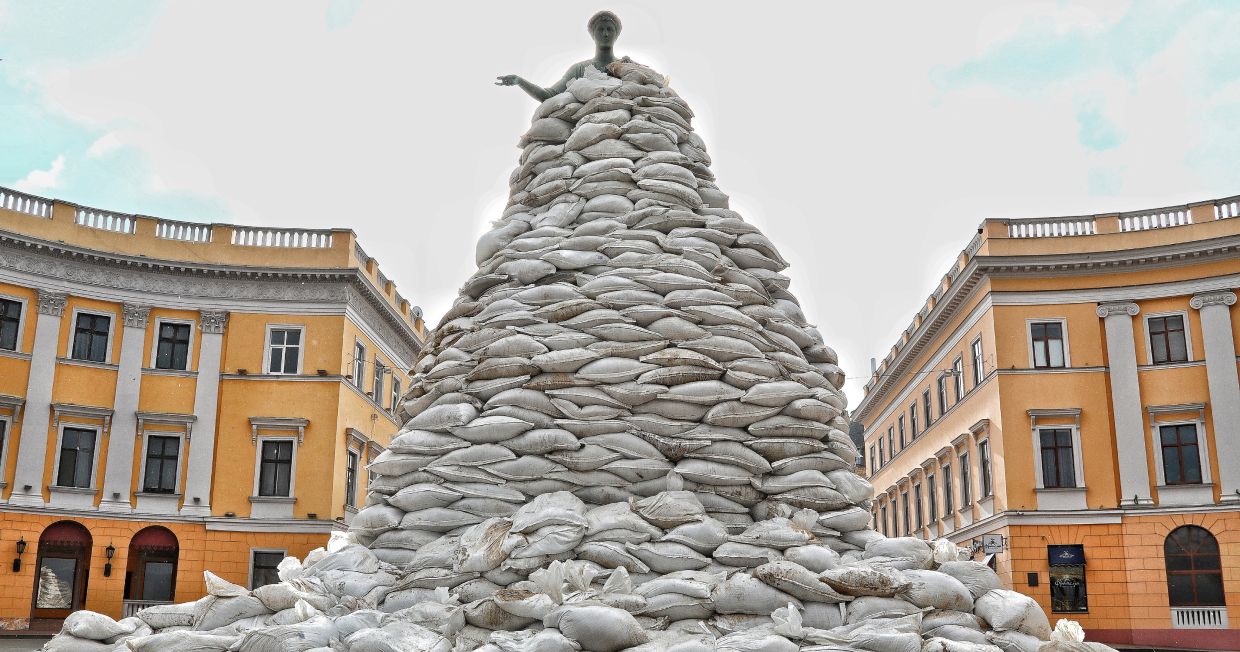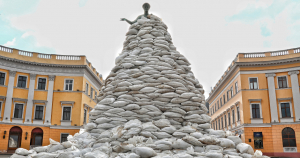
More sanctions on Russia as oil embargo looms

New sanctions
The U.S. and U.K. imposed new sanctions Tuesday, three days after evidence emerged of the summary execution of civilians by Russian troops in Bucha.
- The U.S. focused on the financial sector as it has already imposed an embargo on Russian energy products. The new measures include further sanctions on state-owned Sberbank and leading private lender Alfa Bank. On paper, this means asset seizures and a ban on any transaction with these banks involving U.S. citizens or organizations. But in reality, this is a global ban: anybody who works with a sanctioned organization runs the risk of falling foul of U.S. secondary sanctions.
- In addition, the U.S. last week rendered Russia unable to repay foreign currency debts from the Central Bank’s frozen reserves in U.S. banks. As a result, the Russian Ministry of Finance was, for the first time, unable to meet mandatory Eurobond payments. It looks like Russia is now headed for a default, possibly within a month. However symbolic, this is unlikely to resemble the infamous 1998 default.
- Russian President Vladimir Putin’s daughters, Katerina Tikhonova and Maria Vorontsova, were hit by personal sanctions from the U.S., U.K., and the European Union. Several members of Russia’s influential Security Council also found themselves on the U.S. sanctions list: the new additions included ex-president Dmitry Medvedev, Prime Minister Mikhail Mishustin, Finance Minister Anton Siluanov and Moscow Mayor Sergei Sobyanin.
- The U.K. announced it was freezing the assets of Sberbank and mid-sized Russian lender Credit Bank of Moscow; banning investment in Russia (worth £11 billion in 2020); and phasing out imports of Russian oil by the end of the year. Russia accounts for about 8 percent of U.K. oil consumption.
- At the same time as imposing new sanctions, however, the U.S. also created a system of special licenses that, in effect, removed some areas of the IT industry from sanctions. Specifically, licenses can be issued for: software; communications equipment and technology; and everything connected with social networks, video services and online conferencing and chats. This concession is likely aimed at China rather than Russia, according to The Bell’s market sources. A special license means that companies like Chinese communications giant Huawei can still trade with Russia without risk of secondary sanctions, according to expert Ivan Begtin.
The EU announced a new package of sanctions Friday.
- The biggest new sanction was a ban on Russian coal. European Commission head Ursula von der Leyen said Tuesday that the embargo would be partial (blocking about a third of Russia’s total coal exports to the EU, according to estimates by Alexander Titov, a senior analyst at the Institute of Energy and Finance). However, following discussions on Friday, the EU Commission announced a complete ban. No new contracts can be agreed, and all current deals must end by mid-August.
- Europe will use the time before the ban comes into force to resolve any logistical issues, Kirill Rodionov of the Institute for the Development of Technologies in Fuel and Energy told The Bell. Europe currently gets about 50 percent of its coal from Russia, but this could be replaced by coal from Indonesia and Australia.
- The coal embargo threatens a quarter of Russia’s coal exports: in 2021, the EU, U.K. and Norway accounted for 26 percent of Russia’s exported coal, Rodionov explained. Selling this coal to Asia instead is not possible because of limited rail capacity. The governor of the coal-rich Kemerovo Region in southern Siberia has already asked Putin to free up traffic on the Trans-Siberian and Baikal Amur railroads to increase coal exports to the Far East. “Russian producers cannot hope to avoid a reduction in exports and production if the EU embargo lasts more than just a couple of months,” Rodionov said.
- In addition, the EU closed its ports to Russian vessels (with exceptions for the supply of agricultural products, food, humanitarian aid and energy resources) and banned the transit of cargo from Russian and Belarus to or via the EU (with exceptions for pharmaceutical and medical cargo, and food and agricultural produce).
- The EU also broadened the scope of its technology embargo. It is now prohibited to supply Russia with aviation fuel, semiconductors, high-tech electronics and precision engineering products.
- Finally, new EU import restrictions affect timber, cement, fertilizers, seafood and spirits.
The rallying ruble
Despite sanctions, the Russian currency last week recorded striking growth. The ruble strengthened to 71.4 rubles against the U.S. dollar Friday, significantly stronger than it was before the beginning of Russia’s ‘special military operation’ in Ukraine. But this is no cause for celebration: instead, it’s something of a ‘dead cat bounce’ caused almost entirely by the complete closure of the currency market and a growing imbalance in foreign trade. Demand for foreign currency has fallen due to a combination of Central Bank restrictions and the collapse of imports. At the same time, the supply of rubles continues to grow because of rules obliging all exporters to convert 80 percent of their foreign currency profits.
The ruble could hit 60 against the greenback if nothing changes, analysts told The Bell. That would be a political win for the Kremlin, but it threatens serious problems for Russia’s finances. When the ruble strengthens, the state collects less in tax and duties.
It’s likely the Central Bank will have to look at easing capital controls and currency restrictions, economists told The Bell on Thursday. And they weren’t wrong: the following day, the Central Bank announced it was canceling a 12 percent commission on currency purchases from April 11 and ending a ban on banks selling foreign banknotes to individuals from April 18. These measures are likely to slow the ruble’s strengthening.
In addition, the Central Bank lowered interest rates Friday by three percentage points to 17 percent (it did not wait for a scheduled meeting at the end of April). But this decision had no impact on the ruble. It was most likely taken because of concerns about the latest economic activity data. As inflation figures are improving, the Central Bank is looking to try and cushion the economic downturn, said Raiffeisen Bank analyst Stanislav Murashov.
While energy prices remain high, Russia is confident about balancing the books: oil and gas revenues were up 24 percent month-on-month in March, according to the Ministry of Finance. In addition, the state collected 1.8 times more in the first quarter of this year from energy exports than the equivalent period in 2021. Nevertheless, there are serious questions about the long-term sustainability of these ‘successes’ – particularly if Russia is deprived of access to the European energy market.
What next?
After confirming a coal embargo, the EU immediately turned its attention to a sixth round of sanctions. The key issue – and the most challenging discussion – is set to revolve around possible restrictions on imports of Russian oil.
An oil embargo seemed unlikely until evidence emerged of the massacres of civilians in Bucha and other towns near Kyiv. Now, everything is different. “We’ve stopped coal imports, now we need to look at oil,” van der Leyen said Friday. Josep Borrell, the EU’s High Representative for Foreign Affairs said Thursday that “sooner or later this [oil embargo] will happen”. MEPs voted by 512 to 22 Thursday in support of a symbolic resolution calling for a complete ban on imports of Russian coal, oil and gas.
An oil embargo will be painful for European countries (about 25 percent of Europe’s oil comes from Russia), but not as painful as a ban on Russian gas (the equivalent figure is 45 percent). And it would be a very serious blow to Russia: according to the International Energy Agency, about 60 percent of Russian oil exports go to Europe (making it the leading source of Russia’s foreign currency earnings). Oil accounted for 80 percent of all oil and gas contributions to the Russian budget last month. Over the whole of 2021, oil and related products made up approximately two thirds of oil and gas revenues, and one third of Russia’s total export income.
Europe will find it very difficult to impose an oil embargo because it requires all 27 EU countries to agree. Rising fuel prices have already prompted Germany, Sweden, France and Italy to announce subsidies, drawing criticism from environmental activists.
A total ban on Russian oil imports would add a further 21 percent to oil prices, according to the Oxford Institute of Energy Research. That’s in addition to the current practice when Western companies voluntarily refuse to buy Russian oil. There are widespread fears that another surge in fuel prices could erode public support for Ukraine in the West.
The outcome of this discussion will likely depend on how events unfold on the ground. A rocket attack Friday on the rail station in Kramatorsk, which killed at least 50 Ukrainians fleeing the ongoing fighting, sparked a new wave of outrage in Europe. France’s Finance Minister Bruno Lemaire drew a direct link between Kramatorsk and French support for an oil embargo. “We are determined to go further and secure a ban on oil imports,” he told CNN. France is the leading supporter of an oil ban among Europe’s biggest countries. However, German Chancellor Olaf Scholz made a similar statement Friday, saying Germany could cease importing Russian oil by the end of this year.
It seems unlikely we will have to wait long for news of more tragic events in Ukraine that will, in turn, strengthen calls for more sanctions. There has been no significant news from the Russian-Ukrainian peace talks for almost two weeks: it seems likely both sides feel time is working in their favor. Russian Defense Minister Sergei Shoigu has said that Russian forces will concentrate their efforts on the occupation of the Donbas region in eastern Ukraine. Western military analysts expect a large-scale Russian offensive there in the coming days.




